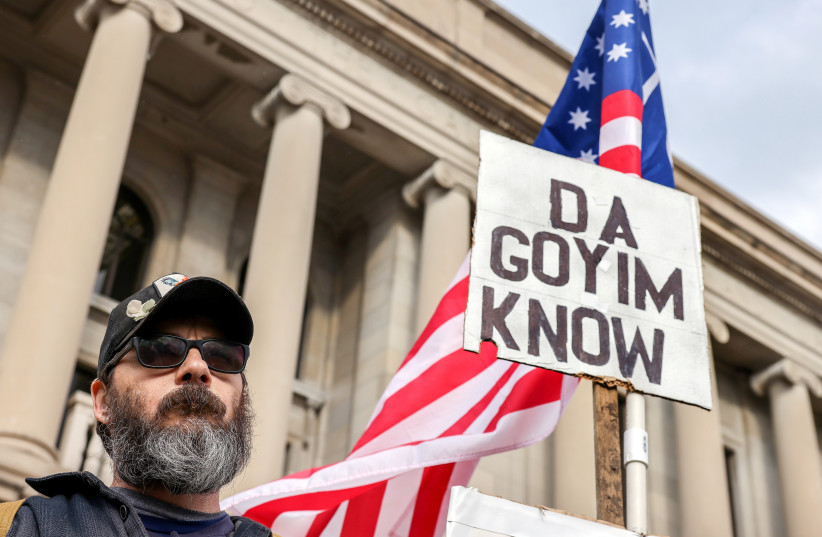In an advisory bulletin released last week, the Department of Homeland Security warned of looming domestic terror threats against migrant communities, LGBTQ+ groups, and (of course) American Jews.
If that sounds as though I have grown numb to the antisemitism in my home country – a country that I am quite proud to live in, I might add – I assure you, I have not. Numb is the opposite of how I feel. Jew-hatred feels like thousands of tiny papercuts to my heart. It hurts me in a way you just can’t see on the outside.
The concern here, aside from the persistent and troubling trend of rising and increasingly loud antisemitism in this country, is that the spot-lighted voices of these antisemitic public figures have the power to inspire others willing to transcend hate-filled speech with acts of genuine violence.
The line is no longer drawn at verbal antisemitism
Throughout my many years in Jewish advocacy, the fight for acceptance has always been an uphill battle. What’s newer to me, is the feeling that the line is no longer drawn at verbal antisemitism. The line, in fact, is nowhere to be seen. Threats to people and property, terrorism and vandalism would occur every so often for as long as I can remember.

Now, every so often has become almost every day. When did this all change? The rumblings started getting louder about a decade ago. The hate even more boldly stepped out of the darkness and into the light, maybe around 2016.
Synagogues are vandalized. Jews are beaten in public places. Neo-Nazis march in the streets. Islamists scream against Jews in megaphones. Campus groups proclaim that Jews are not allowed. It’s enough to make one wonder if this bubbling anger is a symptom of a lonely generation born during the Internet boom, forced to watch life unfold around them through social media during a long and frightening pandemic.
Perhaps those are just excuses. Perhaps I am letting these raged-filled extremists off easy. I did say, after all, that I noticed this uptick in targeted violence since before 2016 – long before the pandemic hit.
Every day, when I look at my social media, I receive hateful comments and messages attacking and condemning me for my Jewish or queer identity, and sometimes both at the same time. The threats are increasing.
But I find comfort in my family, friends, and community of activists, advocates, governmental and organizational leaders with whom I work. I have people who I can reach out to for support or understanding when I need it. Yet, I think of those who do not have that supportive community.
DO I SOUND like I have lost touch by blaming the Internet and social media? Consider this: The Department of Homeland Security told reporters that burgeoning American extremists pose a “persistent and lethal threat,” and that, “these actors continue to exploit online forums to influence and spread violent extremist narratives and promote violent activity.”
What do I do? I warily recognize the malignant hate. When angry people aim their hateful, bigoted, racist, anti-Jewish, anti-LGBTQ, and negativity toward me and my communities, I respond with positivity, strength, power, pride, love, kindness, resilience and endurance I find within myself and share.
I take action by writing articles; speaking on the news; advocating in meetings with politicians, elected officials, foreign dignitaries and organizational leaders. I also speak out and lead workshops aiming to empower, inspire and motivate others to also act.
I collaborate with dozens of national and international organizations representing my targeted communities and other marginalized groups in need. It is a constant effort. Along with the #EndJewHatred movement, I am bringing people together in common cause, and creating regional groups.
People in the fight against hatred must be unified – we truly are stronger together. Those who take action find support in others who take action. This is a fight, and it cannot be fought alone. Community is vital here. So, what can you do? Join me. Join others who are putting themselves out there, who are speaking out and taking action. Collaborate with a regional or national group or create one yourself and invite others to join.
Is it a cliché to suggest that perhaps we combat this rising hatred and violence the same way we would combat loneliness – by reaching out to others for some genuine human connection? For them to see me and my people as actual real people just like them, as opposed to a concept merely based on identity.
Is it cliché to say we need to focus on what starts in the home and the quality of how people are educated in their formative years? For them to be raised with truth, facts and respect for humanity? I would take feeling like a cliché about acceptance, inclusion, respect and education in a safe and civilized world over fearfully looking over my shoulder any day of the week.
The writer is an Emmy Award-winning actor, director and filmmaker who has won over 100 international film festival awards. He is an active leader in the LGBTQ+ and Jewish communities, working alongside governmental officials, foreign dignitaries, and with several prestigious organizations. He is also the director of mobilization for the End Jew Hatred movement.
![American and Israeli Jews [Illustrative] American and Israeli Jews [Illustrative]](https://images.jpost.com/image/upload/f_auto,fl_lossy/q_auto/c_fill,g_faces:center,h_720,w_1280/433149)